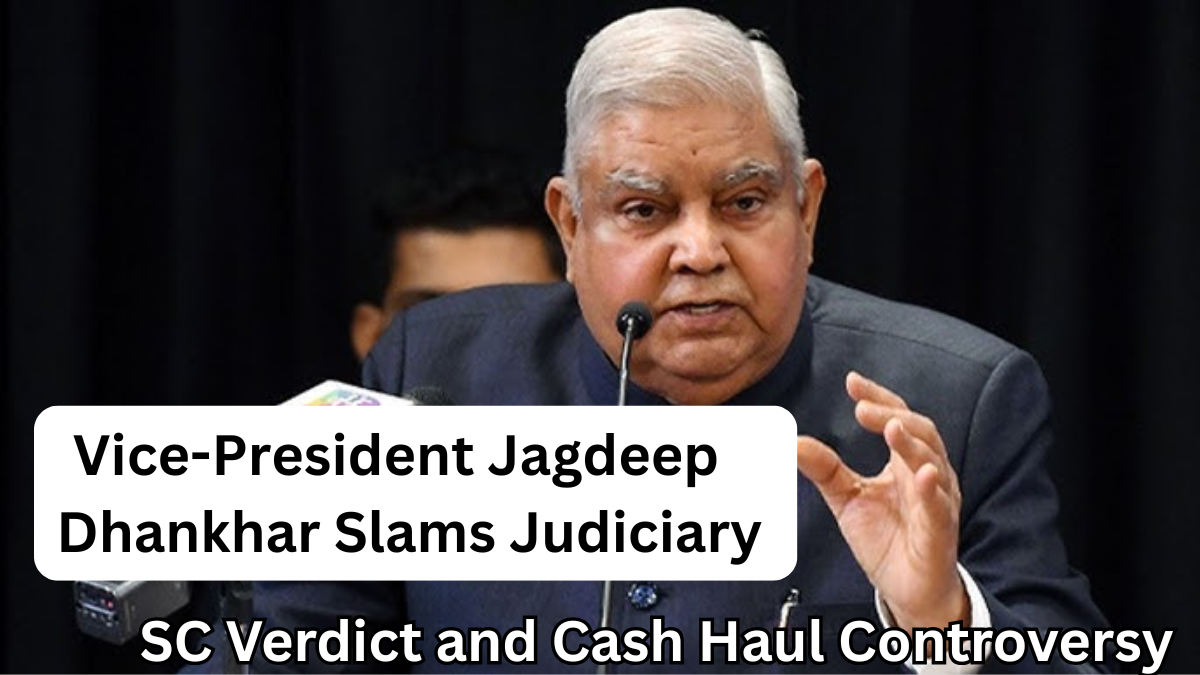In a powerful and pointed address, Vice-President Jagdeep Dhankhar has raised serious concerns about judicial overreach, questioning the growing influence of the Supreme Court on matters traditionally handled by the Executive and Legislature. His remarks follow closely on the heels of a landmark Supreme Court verdict that effectively set a deadline for the President and Governors to clear Bills—a move Dhankhar sees as a threat to democratic balance.
“Courts Cannot Direct the President” – Dhankhar’s Bold Stand
Speaking to the 6th batch of Rajya Sabha interns, the Vice-President said:
“We cannot have a situation where the courts start directing the President of India. That’s not democracy; that’s judicial overreach.”
He took aim at Article 142 of the Constitution, calling it:
“A nuclear missile against democratic forces, available to the judiciary 24×7.”
The Cash Haul Controversy: A Shocking Silence
Dhankhar also referred to a high-profile and alarming event—a massive cash haul from the residence of Delhi High Court Judge Yashwant Varma, discovered in mid-March.
Key Points Raised:
-
The alleged incident occurred between 14th and 15th March.
-
The public only learned about it a week later, on 21st March, via media reports.
-
No First Information Report (FIR) has been filed against the judge, despite serious implications.
A Timeline of Events
| Date | Event |
|---|---|
| March 14–15 | Alleged cash haul at Judge Yashwant Varma’s residence |
| March 21 | First media disclosure of the incident |
| Over a month later | No FIR or official judicial action initiated |
“If this had happened at an ordinary citizen’s house, action would’ve been swifter than an electronic rocket. But here, it hasn’t even reached cattle-cart speed,” Dhankhar remarked with visible frustration.
Why the Special Treatment for Judges?
Dhankhar questioned the apparent double standard in legal accountability, stating:
“Any Indian, even a Constitutional functionary like myself, can have an FIR registered against them. But not a judge. Why?”
He emphasized that:
-
The Constitution only provides legal immunity to the President and Governors.
-
Judges enjoy extra-constitutional protection, which Dhankhar says is not rooted in law but in tradition or judicial precedent.
Who Investigates the Judges? The Question of Oversight
The Vice-President took issue with the fact that a committee of three judges is currently reviewing the cash haul case, asking:
-
What legal provision allows this?
-
Can such a committee recommend action?
-
If yes, to whom and with what consequence?
“The only body that can take action against a judge is Parliament through the impeachment process,” he reminded the audience.
“It’s Time to Blow the Lid Off”
With over a month passed since the cash haul, Dhankhar said it’s time for full disclosure:
“Even if it’s a can of worms or skeletons in the cupboard, let’s open it up. Let the public see what’s going on. Let the cleansing begin.”
He insisted that speed and transparency are essential in preserving public faith in the judiciary.
A Clash Between Judiciary and Executive
Dhankhar’s statements come in response to a Supreme Court ruling involving Tamil Nadu Governor RN Ravi, where the apex court declared his withholding of 10 Bills as both illegal and arbitrary.
The Supreme Court Verdict Highlights:
| Aspect | Supreme Court Stand |
|---|---|
| Governor withholding Bills | Declared illegal and arbitrary |
| Presidential deadlines | Set at 3 months for Bills returned by legislature |
| Judicial review | Allowed over Presidential actions under Article 201 |
| Role of Executive | Must exercise restraint on constitutional matters |
Dhankhar: “This Is Not What We Voted for”
He expressed deep concern over the evolving role of the judiciary, stating:
“We never bargained for democracy like this—where judges legislate, execute, and have no accountability.”
He criticized the blurring of lines between the three branches of democracy and warned that the judiciary was stepping into roles beyond its constitutional mandate.
FAQs
1. What is Article 142 of the Indian Constitution?
Article 142 empowers the Supreme Court to pass any order necessary for “complete justice” in any case. It has been used in landmark cases but is now under scrutiny for potential overreach.
2. Why hasn’t an FIR been filed against the judge in the cash haul case?
FIRs against judges require special approval from the judiciary, even though this is not a constitutional requirement. This special treatment has raised concerns about judicial accountability.
3. What was the Supreme Court’s ruling regarding Tamil Nadu’s Governor?
The SC ruled that Governor RN Ravi’s decision to withhold 10 Bills was arbitrary and set a three-month deadline for Presidential or gubernatorial assent for Bills passed twice by the legislature.
4. What does Vice-President Dhankhar mean by “judges becoming a super-parliament”?
Dhankhar believes that the judiciary is increasingly taking on roles meant for the Legislature and Executive, such as setting deadlines for Presidential actions or reviewing policy decisions—without facing any public accountability.
Click here to learn more
Pari is a passionate writer known for captivating stories that blend imagination and reality. Inspired by travel, history, and everyday moments, Pari crafts narratives that resonate deeply with readers.




